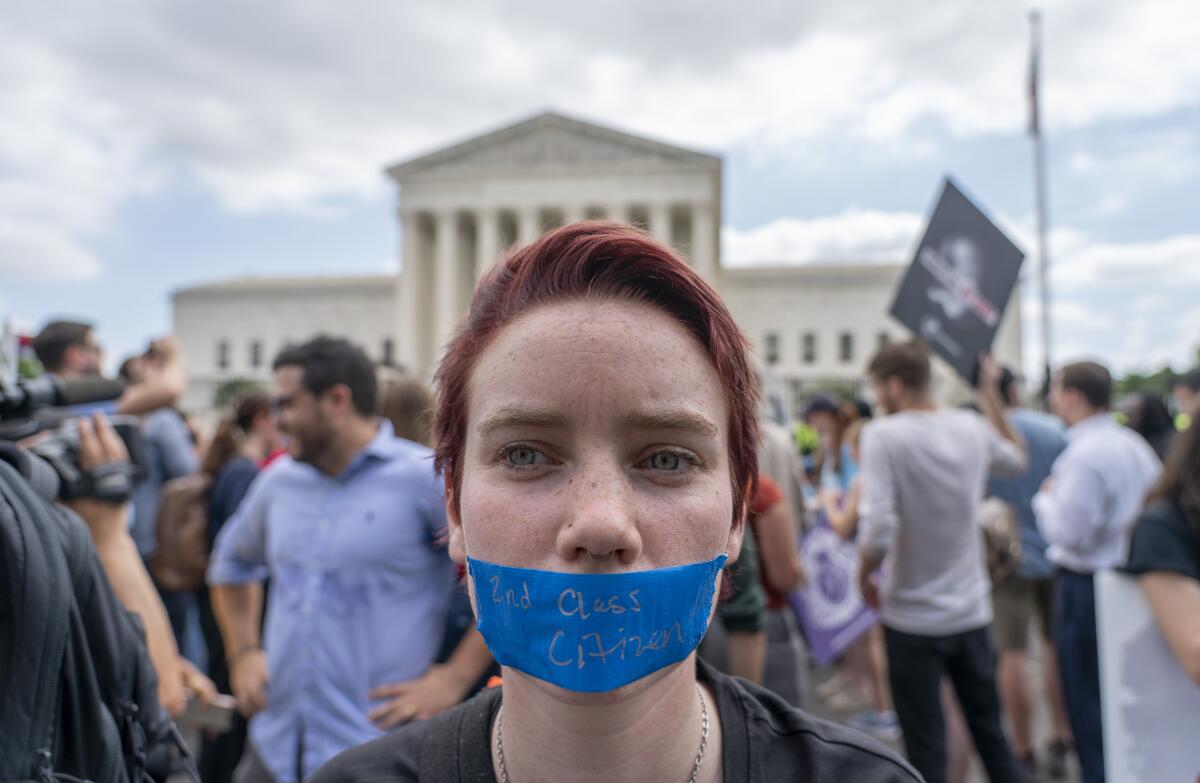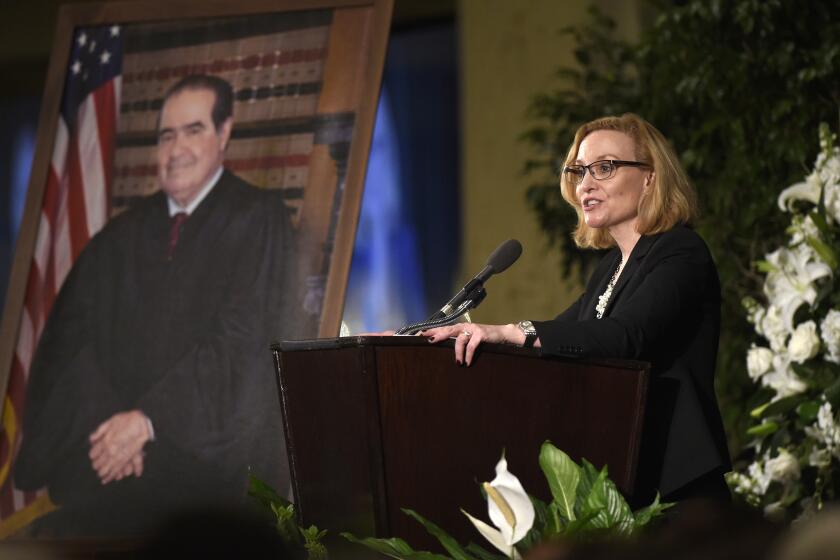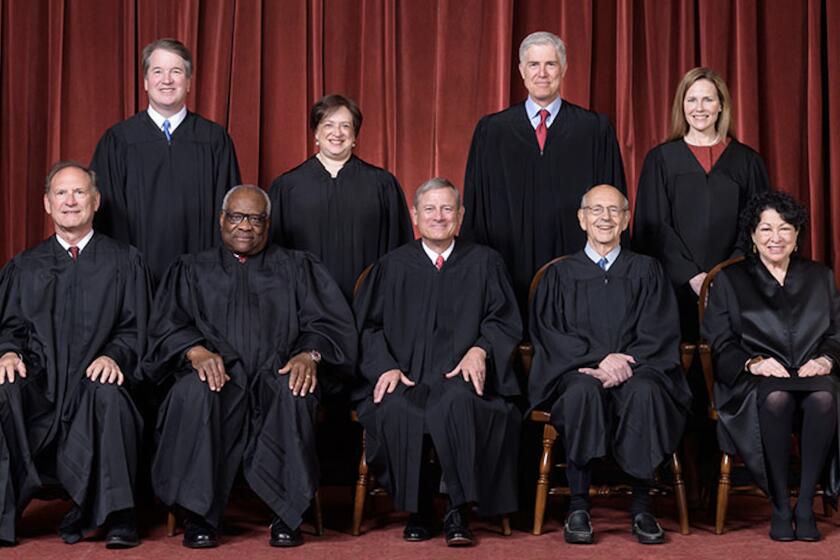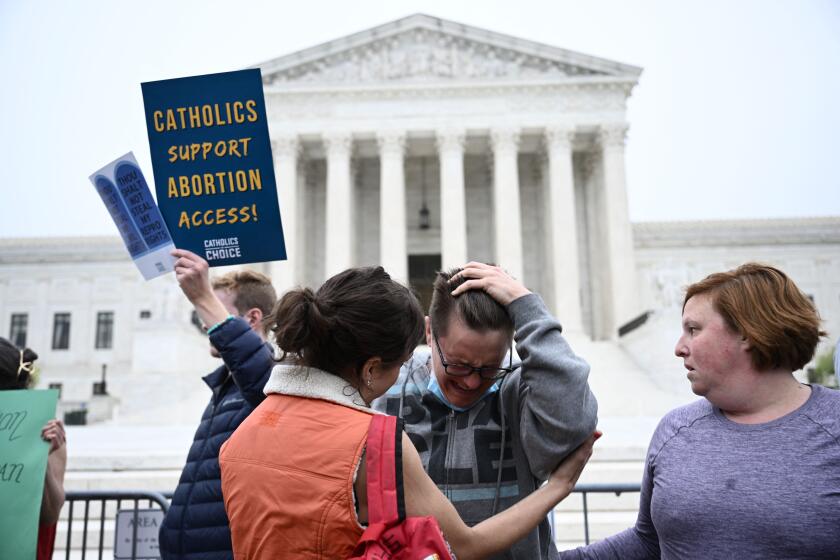Column: Abortion decision means more anger, strife in a country already divided against itself

- Share via
Never before has the Supreme Court so dramatically taken away a constitutional right.
It’s impossible, therefore, to know the full effect of its seismic decision overturning Roe vs. Wade.
Only that life in America will grow edgier, angrier and even more contentious in a country already so deeply divided that it’s more like hostile entities, red and blue, living uneasily on the same landmass.
Democrats hope the shock of Friday’s ruling will galvanize the party’s base, stirring the otherwise apathetic to vote, and also coax support from independents and even some Republicans — especially women — aggrieved at seeing the legal right to abortion vanish into air.
“Democrats needed an energizing, organizing dynamic and this provides it,” said Fred Yang, a veteran Democratic pollster and strategist who is working in a number of competitive House and Senate races around the country.
Heading into November’s midterm elections, the party is battling the twin headwinds of high inflation and low confidence in the Biden administration. “We’ve needed something affirmative to say and an issue where we can say affirmatively we’re going to protect your rights,” Yang said. “This is it.”
Roe vs. Wade went from ‘settled’ law to overruled in a few years, thanks to four unexpected developments.
But the proof points, so far, are few and contradictory.
The first meaningful and lasting test of political consequence will come when control of the House and Senate are at stake this fall along with thousands of legislative seats and the governor’s office in 36 states. Republicans seem all but certain to win the House and stand a good chance in the Senate as well.
If history holds, the GOP will also strengthen its numbers in statehouses nationwide, solidifying gains of the last two decades that resulted in looser gun laws and tougher abortion restrictions in much of the country even before the Supreme Court signaled its assent.
The 5-4 ruling was not a particular surprise. A leaked draft of the decision, which closely tracked the one issued Friday, made the court’s intention clear for the last several weeks.
Since then, there have been a number of congressional and legislative elections, and none suggests an inordinate turnout of Democrats or sympathizers animated by the threatened reversal of Roe vs. Wade. In Texas, the lone antiabortion Democrat in the House, Henry Cuellar, scratched out a primary victory against a fellow Democrat who campaigned with strong backing from abortion rights groups.
Soon after the draft decision surfaced, a survey by NBC showed the abortion issue jumping 16 points in importance for voters compared to when the question was asked in March. In addition, it found the “enthusiasm gap” between Democrats and Republicans — that is interest in November’s election — had also significantly narrowed to the benefit of Democrats.
But that is just one poll. Others show how deeply ambivalent Americans are about legalized abortion, despite the fervor expressed by the loudest and most adamant voices on either side.
The five justices who overturned Roe vs. Wade were nominated by three Republican presidents. Most of the votes to confirm the justices were by men.
In a recent survey by the Pew Research Center just about six in 10 said abortion should be legal in all or most circumstances, compared to fewer than four in 10 who said it should be illegal in all or most circumstances.
But there was plenty of gray.
“In many ways, the partisan divisions over whether abortion should generally be legal in the United States tell only part of the story,” wrote Hannah Hartig, a Pew research associate.
More than half those who supported legal abortion felt there should be limits depending on the timing. Sizable numbers of abortion opponents said the procedure should be permitted in cases of rape or incest, or when a pregnancy “threatens the health or life of the woman.”
Countless elections have shown that the voters who feel strongest about abortion — and especially those who are passionate one way or the other — are already likely to cast ballots and are clear in their minds about whether they support the Democratic or Republican stance.
The key, then, are those with somewhat mixed feelings, the casual voters who might otherwise stay home, and those who are only loosely aligned with one party or the other. The latter are the ones who tend to decide elections, and they typically make their choice based on whatever issue or concerns move them at a given time, not a set of deeply held convictions.
Charlie Cook, a nonpartisan analyst, has spent decades studying campaigns and elections at a granular level and he, for one, is skeptical Friday’s decision will drastically change a political climate dominated by issues — soaring prices, pain at the gas pump, economic anxiety — that work to the benefit of Republicans.
“If this were a level playing field, it might have greater impact,” Cook said. “But when you’ve got the economic situation we’ve got, with a majority — in some cases a big majority — expecting a recession, high inflation, interest rates shooting up, it’s hard for abortion or guns or Jan. 6 to cut through all this.
“It’s like Democrats have dug themselves into a 10-foot hole,” Cook said. “Abortion can fill a foot of it. Jan. 6 can fill a foot. But they’re still in a deep hole.”
Reversing landmark Roe ruling could turn abortion rights from abstraction into major issue
When liberal Justice Ruth Bader Ginsburg died just weeks before the November 2020 presidential election, the Supreme Court was thrust — for a very brief time — to the fore of the political debate. Democrats warned her replacement by Amy Coney Barrett would lock in the court’s conservative majority and guarantee the reversal of Roe.
Then, as now, they expected the abortion issue to electrify the party base and send Democrats surging to the polls. But surveys taken after the election found scarcely more than one in 10 voters cited the Supreme Court as the most important factor in their decision, and a majority of them voted to reelect President Trump.
One of the biggest questions following Friday’s Supreme Court ruling is whether the actual overturning of Roe vs. Wade will matter more to voters than its theoretical reversal, spurring the massive turnout that Democrats are hoping for and Republicans fear.
That — not the raw emotions of this moment — will determine not only what happens in November, but where the country goes from here.
More to Read
Get the latest from Mark Z. Barabak
Focusing on politics out West, from the Golden Gate to the U.S. Capitol.
You may occasionally receive promotional content from the Los Angeles Times.














